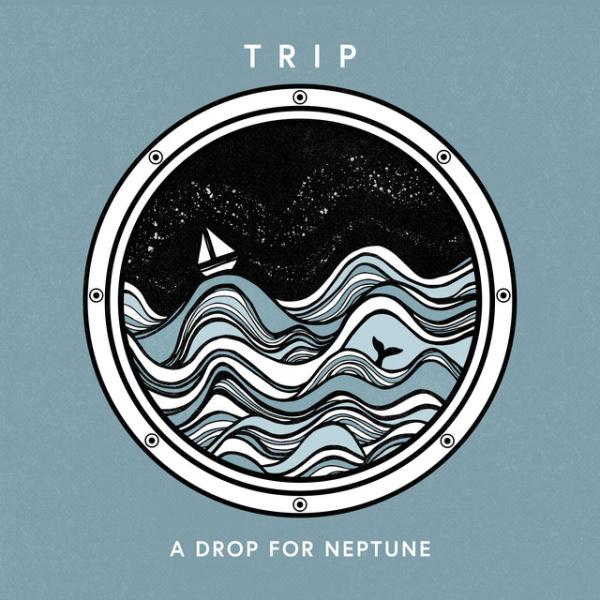June 1, 2022

Trip, “A Drop for Neptune” • So, an Irishman, an Englishman, and a Manxwoman walk into the Royal Conservatoire of Scotland – and wind up forming a band with three Scotsmen. Thus was born Trip some four years ago, whose debut album here (crowd-funded and recorded during the Covid lockdown) takes as its unifying theme the commonality of the sea to the band members’ native grounds, as reflected in the titles for several tracks, e.g., “September Sea,” “The Ninth Wave” and “Towards the Storm.”
Trip’s melody players are Tiernan Courell from Sligo on flute, Michael Biggins from Northumberland on accordion, and Isla Callister from Peel on the Isle of Man on fiddle; their Scots cohorts are Alasdair Mackenzie on guitar and vocals, Rory Matheson on piano, and Craig Baxter on bodhran.
Trip is in similar territory as Scottish-based bands like Talisk and Imar, sporting a muscular, energetic, and tight ensemble sound and a repertoire of mainly original or contemporary tunes in a traditional vein but with sometimes unconventional time signatures, syncopation, distinctive accents, and repeating phrases-cum-riffs. None of which is meant to imply that “A Drop for Neptune” is overly derivative: It’s bright and powerful, but also with plenty of space to appreciate individual musicianship and the chemistry between the band members.
The first track, “September Sea,” comprises traditional Irish and Scottish reels – “Eamon Coyne’s” and “Square da Mizzen,” respectively – wrapped around Callister’s “Mean Fouyir.” She, Courell, and Biggins burst out of the gate together, and the other three join them the second time through the A part, Mackenzie and Matheson holding onto a single chord throughout, creating tension and anticipation until the B part arrives. They let up a little during “Mean Fouyir,” with the spotlight on Callister and Courell and some quiet, sparse chording by Mackenzie, but gradually reconstruct the momentum for the final reel, with Biggins returning; there’s also a marvelous build-up, again through Mackenzie and Matheson’s accompaniment, on the next-to-last A part. Of a similar nature is "The Ninth Wave," which is highlighted by an absolutely rocking "1.2 Twinport" (composed by Matheson).
A pair of jigs – Biggins’ “Madeleine’s,” which serves as the track’s title (plus an introduction to his nimble box playing), and “Rufus’ Request” by Madeleine Stewart – is a somewhat more sedate affair by comparison, but no less ear-catching. There's a little interlude in "Rufus," introduced by Matheson, that gathers strength and revs the engine back up in very pleasing fashion.
Trip evokes its trad roots on "McKay's," with a fiddle-piano duet on the strathspey "Morair Sim" that Courell eventually joins on the way to the second tune, Matheson's "Mairi and Ewen's," which features Mackenzie's nifty flat-picking towards the end.
An outlier, but a spellbindingly lovely one, is Courell's solo of his "Flaich Na Faiche’ (Prince of The Lawn)," which has to be one of the most sublime pieces of music ever written about a dog; his tone, phrasing, and control are all masterful, heightened by Matheson's shrewd, spare accompaniment.
The two songs led by Mackenzie are "Turning Tides," Callister's reflections on visiting her home island after the first Covid lockdown; and a powerful take on John Doyle's saga "The Arabic" – based on his grandfather's harrowing experiences on board a ship sunk by a German submarine in World War I – that benefits from a recurring, suitably dramatic, and storm-tossed interlude.
The album's final track, "Towards the Storm," is an everything-including-the-kitchen-sink affair, segueing from hop jig (Courell's "She Has Locks") to a 12/8 traditional Manx jig ("Hie Mee Stiagh") to reel ("Eye of the Storm" by Courell and Matheson). It's simply an excellent example of arranging a set to showcase the various sounds and textures within an ensemble: a cheery duet between Matheson and Courell (on whistle) at the very beginning, for example; a bracing surge anchored by Biggins and Baxter to kick off the middle tune; and Matheson's fleet-fingered solo at the outset of "Eye of the Storm," with rugged, rocking rhythm from Baxter and Mackenzie (Mackenzie also gets a bit of a guitar solo to set the stage for the band's last run-through).
The pandemic, not surprisingly, was a significant interruption in Trip's growth and development as a band, but as demonstrated on "A Drop for Neptune" – which they officially debuted at the Celtic Connections festival in January – these six are more than ready to set sail. [trip-music.com]

